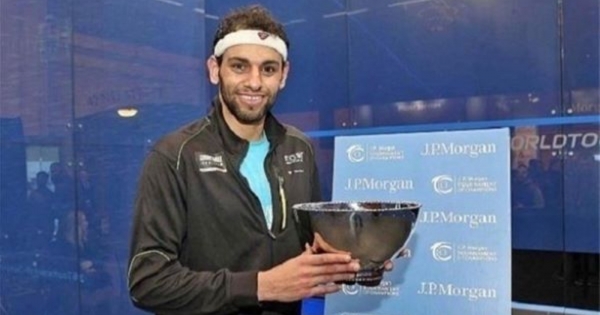Egyptian squash star Mohamed El Shorbagy has been labeled a traitor after making the decision to represent England earlier this month, but he is not the first Egyptian athlete to declare his loyalty internationally, while pundits see it as a widespread problem. related to the fact that athletes feel material and moral injustice.
“Only football and some team games secure the future of an Egyptian athlete,” Hossam Hamed, a former player and coach of the Egyptian wrestling team, told AFP, noting that “material rewards are very weak for champions of individual games.”
He considers defending other countries’ flowers “a rebellion against painful reality and looking for money elsewhere.”
El-Shorbagy explained his choice: “England gave me the support I needed … for many years nobody thought of me (in Egypt).”
The world No. 3 ranked player and the most Egyptian player in history to win professional championships added: “Throughout my entire sporting career, I have not had an Egyptian sponsor.”
Al-Shorbagi (31), a native of the coastal province of Alexandria, is considered one of the most decorated squash players as he spent 50 months at world number one between 2014 and 2021 and holds 43 professional titles in his career. name, in a sport dominated by Egyptians all over the world.
– Out of poverty –
But Al-Shorbagi is not the first to abandon the flag of his country, because he was preceded by athletes in weightlifting, wrestling, equestrianism, boxing and handball…
In 2018, after a disagreement with the local federation, Greco-Roman wrestling player Mahmoud Fawzi showed up in a Team USA uniform before retiring to MMA.
At the Tokyo Olympics last summer, Egyptian-born Qatari weightlifter Faris Hassuna, 24, won the gold medal in weightlifting, causing an uproar on social media.
His father and coach Ibrahim, a former coach of Egypt, explained that he left the country with him when he was young after an argument broke out between him and the local federation while heading to Qatar to train.
In both sports, “the players come from poor families,” according to Fathi Zureik, former coach of the Egyptian weightlifting team, and it’s the game in which Egyptians have won the most Olympic medals. “They think about naturalization in order to look for money and improve their social status.”
Zureik cited a “lack of fairness”, wondering: “How after all the preparations and qualifications, the reward for winning Olympic gold will be one million pounds (about $54,000) compared to some football players who receive up to one million dollars a year.” possibly without a championship.”
– “Just a commodity” –
But in handball, the picture looks more rosy, according to the former captain of the national team and the head of the handball apparatus of the Al-Ahly club, Yasser Labib, who stated that “the phenomenon of naturalization of handball players has completely disappeared after the suffering of the late nineties with the departure of a whole generation of young people to play under flags of the countries of the Persian Gulf.
He added: “As time went on and salaries rose at Egyptian clubs, their naturalization thoughts became less frequent and their ambitions for European professionalism began.”
The solution, in his opinion, lies in eliminating the narrow divisions within the federations and increasing the funds allocated to athletes.
This could prove to be a daunting task for the Egyptian government, which is currently stuck between high inflation and a sharp currency devaluation.
Even before this period, support allocations from the Ministry of Sport amounted to around £400 million (about $21 million) in the 2019-2020 season in a country of over 100 million, compared to $1 billion. , for example, for a country like France.
Experts believe that the decision may come from sponsors, but Hamed adds: “For sponsors, a player is just a commodity that can be used to generate financial and advertising profits. As soon as a player retires or gets injured, the deal is over. “
Former squash coach Amir Waguih also believes the support should continue beyond retirement through the provision of employment opportunities, stressing: “We need to study this phenomenon before it spreads to Egyptian players, especially since most of them study outside of Egypt. on scholarships in European countries. and American universities.
Unlike weightlifting and wrestling, squash players come from wealthy communities, train at elite clubs, and capitalize on their victories by receiving scholarships to elite American and European universities.
Waji sees that they are looking not only for money outside their country, but also for opportunities “for a better future after retirement” that they won’t get at home.
– gloating and hugging –
After losing his first championship under the English flag, Al-Shorbagy was subjected to a flurry of sarcastic comments. One Facebook user wrote: “After the loss of the Englishman Muhammad Al-Shorbagy.. a message to the English Squash Association.. goods sold are not returned or exchanged,” while another wrote on Twitter: “Damn.” The pharaohs hit him.”
The local newspaper Al-Dustur criticized Al-Shorbagi and demanded that he be stripped of his Egyptian citizenship: “Mohamed Al-Shorbagi decided to represent the England team instead of Egypt, and this is his decision. …so why not accept our decision to strip him of his Egyptian citizenship as well?”
On the other hand, the Egyptian sports minister, commenting on the player’s crisis, said that he was not distressed, “it’s decent to have an Egyptian product in England, because he left and his name is Mohamed El-Shorbagy, an Egyptian.”
He added that if El-Shorbagy wants to return to Egypt again, “this is his country and he is our son, and we will embrace him.”
Source: El Iktisad
